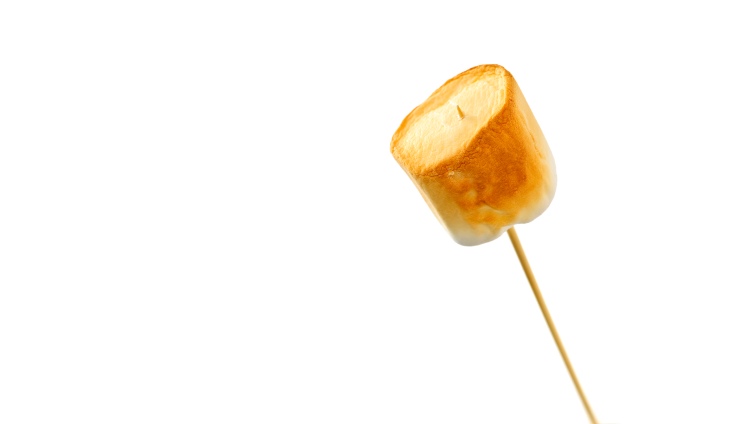In the late 60s and early 70s, Walter Mischel studied the ability of preschoolers to resist temptation. The children, ages four to six, were given a marshmallow and a challenge: if they could resist marshmallow and not eat it for fifteen minutes, they would get a second marshmallow. (This is widely known as the Stanford Marshmallow Experiement.)
Only one-third of the children were able to wait the fifteen minutes. When Mischel followed up with these students as teenagers and adults, those who were able to wait had higher SAT scores, more confidence, and greater self-worth. The ones who couldn’t were more likely to have problems with addictive behaviors, including alcohol and obesity.
Sesame Street recently visited this study with Cookie Monster playing The Waiting Game. It’s a brilliant video. As Cookie Monster waits for Guy Smiley to return, he even teaches kids distraction techniques, straight from Mischel’s study.
It’s not just preschoolers and furry blue monsters that face this dilemma. Eating that donut is a very tangible, immediate reward. Looking great, feeling great, and having the energy (and knees) to play with your grandchildren is a very fuzzy notion. That reward is a long ways off. That’s why it’s so hard to hang on to.
Why deprive yourself of the first marshmallow? It’s here. It’s now. It’s a certainty.
It’s also holding you back.
By learning to delay gratification, you:
- Develop self-control. Psychologists consider self-control to be the greatest single indicator of how successful you will be. It’s the “master virtue”. Think of it as mind over matter, focus and intensity, or keeping the end in mind. You are the master of your fate, the captain of your soul.
- Keep first things first. We’ve all been there. You plan your day, then as you’re working your way down the list, you get interrupted. Something so urgent that if it doesn’t get done right now it won’t get done. Something less important than what you’re doing, but it threatens to derail your day anyway. (I fight this constantly.) Don’t get caught up in the thick of thin things. Write it down. If it’s important, it will get done later. If it’s not important, you’ll be glad you didn’t waste your time.
- Buy less stuff. I couldn’t tell you the number of times I’ve wanted something so badly right up until I forgot about it. By the time I remembered it three weeks later, I had realized I could get by just fine without it. Fewer impulse purchases means more money stays in your pocket and less stuff accumulates in your house.
- Stay out of debt. Wait to buy something until you can afford it. There’s a reason dealerships make more money when they sell a loan than when they sell a car. As Joachim de Posada puts it at the end of his TED talk: “We need to learn that principle here in the [United] States, because we have a big debt. We are eating more marshmallows than we are producing.”
- Build wealth. There is a strong metaphor here with the time value of money. The only place you can double your marshmallows in 15 minutes is in Vegas (or a research study on delayed gratification). But if you invest early and often, you will end up with a lot more marshmallows down the road.
The key to waiting is twofold. First, you need a strong connection to why you’re waiting. You’re not giving up something for nothing, you’re giving up something good for something better. Once you’ve made the decision to wait, distract yourself. Just stop thinking about it. Go focus on something else. The fifteen minutes will pass before you know it, and you’ll be a better person.
Question: What are you waiting for, and why are you waiting for it? Share your thoughts in the comments, on Twitter, LinkedIn, or Facebook.

